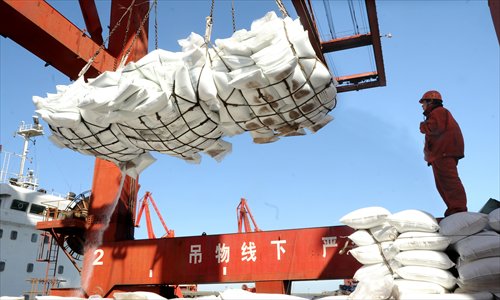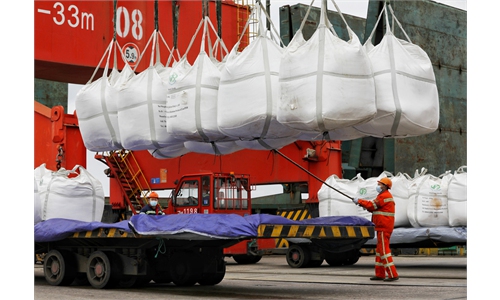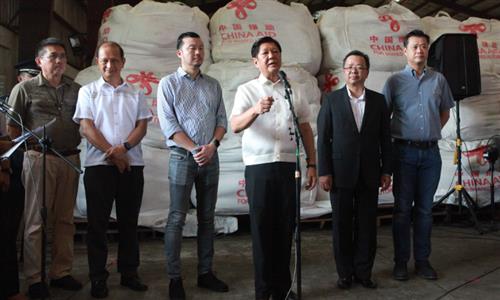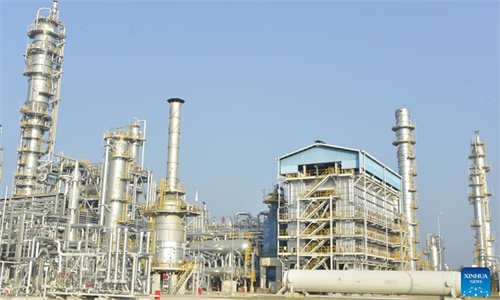Nation striving to secure urea supplies; ‘export control’ rhetoric dismissed: industry insiders

Packages of imported urea are unloaded from a ship Sunday in Lianyungang port, East China's Jiangsu Province. The price of urea dropped by 0.4 percent in mid-February from a year earlier, according to the National Development and Reform Commission. The agency also expects the price of fertilizer will grow only slightly this year because of increasing supply. Photo: CFP
China's chemical fertilizer industry is ramping up efforts to secure urea supplies while stabilizing market prices in response to the government's call, the Global Times learned from industry insiders, who dismissed so-called export control claims by some foreign media outlets.
Topics regarding export delays for urea, a nitrogen-based product used as a fertilizer in agriculture and as a way to curb diesel and industrial emissions, have appeared in the headlines of several media reports, with some even claiming that "China will implement an export quota system targeting urea starting next year," as Chosun Ilbo in South Korea reported on Tuesday.
Reuters reported that "South Korea on Monday said it will consult with China to prevent disruption to urea supplies after Korean companies reported the fertilizer and emissions-reducing chemical was taking longer to pass through Chinese customs on its way to the peninsula."
In response to the report, industry insiders told the Global Times that efforts have been made to secure and balance the supplies of urea while managing to stabilize the price. They also denied claims that there was an export ban or other controls on urea.
"There is no such thing as export controls," Wang Liqing, secretary-general of the China Nitrogen Fertilizer Industry Association (CNFIA), told the Global Times, noting that what has been happening is in line with WTO rules.
The industry is implementing policies to ensure supply and stable prices under the government's urging, Wang said.
Production capacity has been expanding in a steady manner.
A manager surnamed Jin with Shandong Hualu Hengsheng Group Co, a company that produces and sells chemical fertilizers, told the Global Times that several new projects have been put into operation this year to meet the growing demand.
This year, domestic urea output is expected to reach 60 million tons, according to the secretary-general, which would be an increase of nearly 7 percent from last year.
In response to a media query over the claimed "export control tightening" on urea and other chemicals, China's Foreign Ministry spokesperson Wang Wenbin said on Wednesday that China is a major supplier and consumer of fertilizer, and an important participant in the international chemical fertilizer trade.
In the first 10 months of this year, China exported 25.72 million tons of chemical fertilizers, a year-on-year increase of 28.8 percent, Wang noted.
China is the world's largest producer and consumer of urea, mainly exporting to countries such as India, South Korea and Australia. South Korea, for example, imports more than 90 percent of its urea supply from China, according to media reports.
Starting in mid-June, urea prices began to rise rapidly, and by the end of July prices had risen 30 percent in cumulative terms, the Global Times learned from insiders.
"The increasing global demand and a reduction in domestic inventories further drove up the urea prices in August and September," Xu Xiaoyun, an analyst on chemical fertilizer at JLC told the Global Times.
Now is the stage of fertilizer preparation for spring plowing next year, and stabilizing prices and ensuring supplies of chemical fertilizers are increasingly important in the context of food security, another industry insider said.



